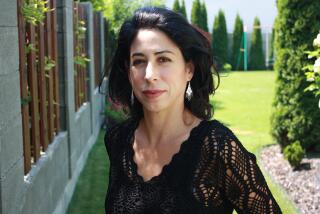An offbeat dialogue covering marriage and home
- Share via
“A House in Istria” is about obsession. This debut novel by Richard Swartz, a veteran Swedish journalist based in Eastern Europe, has nothing resembling a plot. Instead it’s made up of hilariously convoluted conversations resulting from one man’s determination to buy a house.
The object of the man’s fixation is an abandoned 200-year-old residence, next door to his own, in the Croatian region of Istria. The man doesn’t explain to his wife why he wants the house, only that he must have it. Both characters are nameless; the woman, who narrates the story, is a native Istrian, her husband is not. She speaks the local dialect, as well as the commonly understood Italian, neither of which the husband understands or bothers to learn. And so his much-put-upon wife perpetually has to translate conversations for him.
“A House in Istria” begins as absurdly and mysteriously as it ends. One evening in July, in the midst of a terrible heat wave, the husband leaps up and announces to his wife that “I must see it at once, this evening, right now, I cannot wait any longer” -- an eruption that the woman attributes to “[t]he moon, our fat moon of Istria that drives people and cattle mad.” The man climbs over the wall separating their house from the one next door, bloodying his hands in the process.
It’s immediately clear that an already frail marriage is about to be tested further. The husband, home-buying aspirations aside, is difficult to live with. He complains about the way his wife makes the bed, rarely listens to anything she says and often behaves like a petulant child.
The woman gives a clear idea of what she’s dealing with: In one scene, she describes her husband muttering to himself, then going into the kitchen, “where he got himself two cold beers from the fridge, the last piece of our Hungarian salami, a couple of slices of rye bread and the Krk cheese that my mother sent me, and all of it he wolfed while his eyes almost closed again, his drooping eyelids swollen, practically black, and afterwards he spent rather a long time on the toilet.” Aside from being a portrait of a marriage, the novel also offers insight into a region struggling to reconcile its war-torn past with modern-day capitalism. The husband is frowned upon by his neighbors as an outsider with no regard for Balkan history or for those around him -- and this disrespect comes back to haunt him as he seeks to buy the house. “You’ve got to be friendlier towards the people in the village....” his wife says. “You should take an interest in their stories and try all the tasty tidbits they offer you, preserves or cakes or whatever it is.”
The woman is reluctant to leave the perfectly comfortable house where she lived long before meeting her husband. The idea of trying to “upgrade” to a larger home makes her worry about what others in the village will think. Yet she tags along as he tries to find out who owns the house and how much it would cost. The novel covers a week in the life of this hapless couple, chronicling the quixotic mission through a series of bizarre conversations that go nowhere. First they approach a neighbor named Dimitrij, who has made the mistake of starting a vegetable garden on the property the husband already considers his own. Dimitrij responds to the angry man, and his embarrassed wife, with scorn: “Imagine! He’s taken over the empty house and now he stands there accusing me of having broken into his house.... Maybe it’s you who owe us an explanation?”
The couple also visit an eccentric local man named Beppo who knows all the local gossip, but he proves unhelpful in giving any leads. They also have a lengthy visit with Franjo, the wife’s lawyer, who explains to them that “in this country blood is of the utmost importance,” and therefore the man has no right to buy the house. “As far as we Istrians are concerned,” he tells the woman, “your husband is a complete stranger .... Forget that house. It’s not for sale.”
The encounter with Franjo is surreal, as he finds dozens of ways, over a matter of hours, to let the couple know that they cannot have the house. Eventually they find their way to the owners, Signora Nina and Signor Antonio, who live in Trieste.
That meeting is just as hopeless as their previous ones, as Antonio explains his kidney problems in detail, and Nina keeps changing the subject to anything but the house. Meanwhile, the wife translates the dizzying conversation in its entirety, and Nina criticizes her for passing on extraneous information to her husband.
For a novel where everyone is odd, nothing is fully explained and not much happens, “A House in Istria” is a worthwhile read. Lacking a tidy resolution, this quirky, antic novel is frustrating at times, yet it’s also weirdly absorbing and funny.
More to Read
Sign up for our Book Club newsletter
Get the latest news, events and more from the Los Angeles Times Book Club, and help us get L.A. reading and talking.
You may occasionally receive promotional content from the Los Angeles Times.








